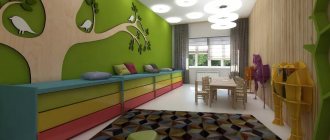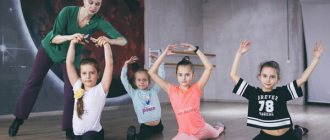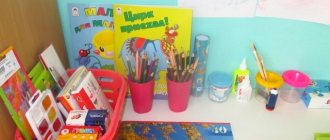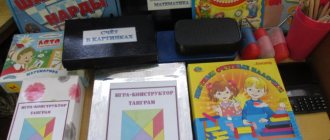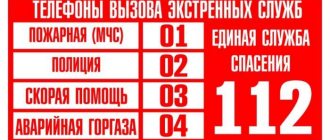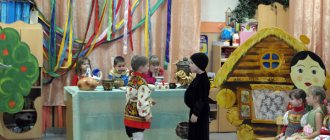Parents' corner according to FROGS in kindergarten: important design rules
Parent's corner according to FROGS in kindergarten: important design rules
Most people don’t even think about the fact that parent’s corners in kindergartens must be designed in accordance with some rules. But in fact, there is even a special passport that specifies the characteristics of the corner.
The passport contains the following information:
- Initially, the name of the parent’s corner is written in the passport, for example, the “Health” corner, the “First-Grader” corner.
- Next comes a description of the group - its number is indicated, as well as the exact age of the children who attend it.
- Further, the passport indicates the purpose for which the parent corner was created, for example, in order to tell parents what the children did today, or when the holiday matinee will be held.
- It also indicates what visual materials were used, as well as their quantity, for example, wall posters or special maps.
- If the corner has a thematic focus, for example, helping parents teach their children, then the passport contains a card index of games and exercises that are recommended to parents.
Parents' corner according to FROGS in kindergarten - important design rules:
- The parent's corner should satisfy not only the interests of parents, but also children, according to their age. This means that while mom or dad is studying information, the baby should also be busy with something. For example, even looking at funny pictures.
- Visual aids and materials also need to be selected taking into account the age of the children in the kindergarten group. So, in the nursery group there is no need to place stands with the alphabet. This age category is currently only interested in bright pictures.
- The parent's corner should look as aesthetically pleasing as possible. It is best to use bright colors and more beautiful fonts for headers and titles.
- The corner should be located in the most convenient place. It should be well lit, otherwise it will be difficult for parents to read the information that is written in small print. If it is not possible to place the stand in the brightest part of the room, you need to consider an additional light source.
- In the parent's corner of the kindergarten there must be information that takes into account regional characteristics - life, crafts, types of art, language.
Consultation on choosing a stand for a kindergarten
The manufacturer “Noex-Russia” offers customers assistance in choosing the design of a children's stand. Available for order: teacher’s corner, stands for speech therapists, stands for parents, duty corner, “Congratulations” stands and others. You can order any number of stands from our company. We will select the desired size, number of pockets, color scheme, and print a personal heading. At your request, we will develop and produce a series of boards designed in the same style.
We will apply the required information and equip it with the required number of pockets to accommodate current information. We will attach bright and beautiful themed stickers and reminders. We guarantee that the finished product meets all the requirements of the educational institution. We will deliver from 1 piece. to any locality in Russia.
Materials for the parent's corner in the preschool educational institution - information in the parent's corner
Materials for the parent's corner in a preschool educational institution - information in the parent's corner
And now, let's figure out what information can be placed in the parent's corner. Remember that it should be presented as positively, clearly and, if possible, in not very large volumes. It is unlikely that parents will stand near the stand for a long period of time; they should see a short and informative message in front of them. It is also important to take into account that when placing printed information on a stand, it is necessary to indicate the authorship, date of publication of the material, and, if available, a link to the website, so that you can familiarize yourself with the material in full.
Materials for the parent corner in the preschool educational institution - information in the parent corner:
- Materials about the physical development of children
- Materials about the mental development of children
- Materials about aesthetic education
- Materials about developmental features
- Materials about health, ways to improve your health
- Materials about self-care skills
- Materials about planned classes
- Materials about children's literature
- Materials about music and musical works
- Materials about teaching methods for preschoolers
- Materials about the seasons
- Materials on speech development
- Advice from psychologists, speech therapists, pediatricians
- Thematic materials - New Year, March 8, Easter, February 23
What information is useful for the stand?
Important announcements are the most visible part of the stand. Here you can talk about meetings and upcoming vaccinations. Give advice on how to prepare for upcoming events.
What advice can you give to parents:
- How to overcome vagaries? A child is hysterical - how to help him?
- How to plan your daily routine, rest, activities. Instructions with pictures will do.
- Menu. How to properly plan home meals, what to consider. Every morning, parents can find out what dishes are on today's list. This especially plays a role if there are children in the group with special nutrition - for example, allergy sufferers.
- Useful recommendations from specialists of a narrow profile - speech therapist, psychologist.
- About plans and upcoming events, tips for preparation.
You can share with parents your plans and successes in the development of your children. Post a list of activities and lessons for the day. Indicate topics, goals, desired results. What the children have done is displayed on a special stand. Additionally, they add recommendations on what skills to pay attention to when raising them.
You can also use:
- Ideas for joint activities with children.
- Advice on child development and skills.
- Recommendations for specific ages. For example, advice from pedagogy and psychology applicable to the age group.
- Reminders: what to bring to class, what needs to be repeated or learned.
- Information about the child’s personal achievements.
Separately, data on the age group is provided. Indicate standards for weight, height, skills and other characteristics. As a rule, information is updated annually.
Parents' corner for a nursery group in a kindergarten
Parents' corner of the nursery group in kindergarten:
- In the parent's corner of the nursery group of a kindergarten there must be information on how to adapt a child to kindergarten.
Parents' corner for a nursery group in a kindergarten Parents' corner for a nursery group in a kindergarten
To defuse the situation, humorous rules for parents can be placed in the parent's corner.
Parents' corner for a nursery group in a kindergarten
We must also remember that this age category of children is very strongly attached to their parents; they simply cannot imagine their existence without them. To make the morning separation ritual as comfortable as possible, teach your parents how to do it correctly.
Parents' corner for a nursery group in a kindergarten
Parents' corner for a nursery group in a kindergarten
Parents' corner for a nursery group in a kindergarten
It is also important to explain to parents what they cannot bring to kindergarten. This way you can avoid the occurrence of not very pleasant situations.
Parents' corner for a nursery group in a kindergarten
Be sure to place material on the physical characteristics of young children at the orientation booth. It is important that parents understand in time that the baby is tired and it’s time for him to rest. The psycho-emotional and physical health of the baby depends on this.
Parents' corner for a nursery group in a kindergarten Parents' corner for a nursery group in a kindergarten
And of course, don’t forget about entertainment for the kids. Advise parents on how to entertain their child.
Parents' corner for a nursery group in a kindergarten
What kind of stands are there?
Several types of stands are placed on the walls of the preschool educational institution at different levels. Below, at the level of children's eyes, are intended for children. These could be colorful signs, instructions, duty schedules, safe routes from home to kindergarten. All information for children's information boards is accompanied by clear infographics and bright illustrations.
Above is information for parents, employees, and regulatory authorities.
In the foyer and corridors it is customary to hang:
- general information about the institution and educational activities;
- information about health improvement and clothing requirements for children;
- menu and information about catering (portion weight, calorie content, cost calculation and relevant regulatory documents);
- a safe route diagram with a visual image or photographs of traffic intersections, pedestrian crossings, park areas, public transport stops in the area adjacent to the preschool educational institution;
- occupational safety corners and notice boards for personnel.
Next to the offices of specialized specialists there are thematic corners: speech therapist, psychologist, music director, physical education instructor and additional education teachers. They must contain a photograph and personal information, including level of education, experience, telephone number, brief information about the program being implemented, class schedule, achievements of the teacher and children.
In group rooms and locker rooms there are stands informing parents about the daily life of the group with psychological and pedagogical characteristics of pupils of a particular year of life, announcements of events, photographs of routine moments and creative reports. The stands “Our Group”, “Birthday Boys”, “Our Creativity”, “Safe Summer”, “Home Reading Corner” and others are intended for children.
To the catalog of stands for kindergarten
Parents' corner for the younger group in kindergarten
Parents' corner for the younger group in kindergarten:
At this age, it is already possible to begin intensive training for children. You can start with the rules of behavior. Of course, the kindergarten teacher will introduce children to the rules of behavior in society, but it will not be superfluous if parents also help children to socialize in society correctly.
Parents' corner for the younger group in kindergarten
Don't forget to add information about your child's greed in the parent's corner. Parents must clearly understand that the baby is growing up as a little greedy person, and while there is an opportunity, help him learn to notice the needs of the people around him.
Parents' corner for the younger group in kindergarten
Help parents not make mistakes when raising their baby. After all, some people believe that shouting and punishment can teach something. As a result, the child moves away from his parents and stops trusting them.
Parents' corner for the younger group in kindergarten
At this age, the child must understand that his things must be put in a certain place. Even if he doesn’t do it very carefully, he does it on his own.
Parents' corner for the younger group in kindergarten
It is also important to teach parents to give their child some freedom. It is important that they understand that overprotection will cause many problems over time.
Parents' corner for the younger group in kindergarten Parents' corner for the younger group in kindergarten
We also need to make sure that parents understand the importance of walking in the fresh air. After all, modern kids are literally familiar with Internet technologies from the cradle, and prefer watching cartoons instead of active pastime.
Parents' corner for the younger group in kindergarten
You can also use posters with information about proper dental care as educational material.
Parents' corner for the younger group in kindergarten
It is important to draw the attention of parents to the rules of nutrition so that the baby does not have health problems in the future.
Parents' corner for the younger group in kindergarten
There must be information in the parent's corner on how to properly develop a child's skills.
Parents' corner for the younger group in kindergarten
In the parent corner of the younger group there must be educational information about the danger that may await the little one.
Parents' corner for the younger group in kindergarten
Parents' corner in the garden for the middle group in kindergarten
Parents' corner in the garden for the middle group in kindergarten:
Be sure to place a special reminder in the parent’s corner about the advisability of punishing the child, because sometimes parents, as they say, “go too far,” and this behavior affects the emotional state of the baby.
Parents' corner in the garden for the middle group in kindergarten
Don't forget about the advice of a psychologist. Parents must clearly understand that the atmosphere in the family has a huge impact on the development of the baby and its socialization.
Parents' corner in the garden for the middle group in kindergarten
A reminder about how a child should behave at home will also not be superfluous. After all, the mother may go to the pharmacy or the store for a couple of minutes, and the child must clearly understand that at this time he cannot let strangers into the home.
Parents' corner in the garden for the middle group in kindergarten
A cheerful poster about a healthy lifestyle will appeal to both kids and parents.
Parents' corner in the garden for the middle group in kindergarten
Some children, due to their shyness, find it difficult to make contact with unfamiliar people, and this can become a problem - the child will not have friends. Parents should understand that this is a bad situation and try to solve the problem in a timely manner.
Parents' corner in the garden for the middle group in kindergarten
Each child is unique - some children are very calm, others live in their own imaginary world, and still others have many internal fears. Parents need to understand how to behave in different situations.
Parents' corner in the garden for the middle group in kindergarten
Parents' corner in the garden for the middle group in kindergarten
Advice from a speech therapist will also not be superfluous. After all, before enrolling in school, the child should not have problems with speech.
Parent's corner in the garden for the middle group in kindergarten Parent's corner in the garden for the middle group in kindergarten
Materials for the stand “To help parents”
Memo for parents on labor education
The essence of labor education
consists of introducing them to available work activities and developing a positive attitude towards the work of adults.
But in order for a child to be actively involved in work, it is important to instill in him labor skills and abilities, the desire and desire to work independently.
Labor education of children should not be carried out in isolation from family education.
The family has favorable conditions for developing hard work in children.
Working together with parents brings joy to the child
.
Participation in household work allows the child to really feel his involvement in the concerns of the family, to feel like a member of the family team. It is important to organize the work of children by parents in such a way that children can not only observe it, but also participate in it. To successfully implement labor education in the family, parents can be guided by the following recommendations:
- Communicate
child to work family matters as early as possible;
- Pin
the preschooler has constant responsibilities for which he is responsible;
- To not allow
deviations from the requirements accepted by adults, otherwise the child will evade fulfilling his duties;
- Don't punish
child through labor: labor should please and bring satisfaction;
- Learn
the child to work, instilling in him the basic skills of a work culture: rational work methods, proper use of tools, planning the labor process, completing work;
- Don't give
the child is given too many tasks, but assigned work with sufficient load;
- Don't rush
, do not push the child, be able to wait until he completes the work himself;
- Do not forget
thank the child for something that required special efforts from him;
REMINDER FOR PARENTS:
“How to develop creativity in children.”
- Try to determine the child's interests
. Find what he likes most and try to encourage such activities in every possible way.
- It must be kept in mind that a child’s imagination is limitless.
- The child needs pauses between active actions to comprehend everything that happened.
. There is no need to rush, because at this time some interesting idea may arise in his mind, which may amaze with its originality after the baby returns to reality.
- D
For the favorable development of creative abilities, it is worth
creating certain conditions not only at school, but also at home
. Allow the child to think for himself how to implement the idea using certain means. - Create together
. Don't complain about lack of time or fatigue. Creativity is also a kind of relaxation, especially with your beloved child.
Come up with a fairy tale together with your child, or take a ready-made one and translate it into material form.
- Don't forbid your child to use your things
. Thus, you provide your child with space for imagination and play experiments.
- Answer your child's questions
. Don’t forget that for your child you are the key to a big world of discoveries.
Memo for parents on education
culture of behavior in children
- Do not show
your child ostentatious politeness and sensitivity
. Very soon he will begin to imitate you and do the same thing first. turn in relation to yourself. - Don't
be rude or use foul language
yourself. Your habit will become your child's habit. - Don't speak badly or disrespectfully about strangers.
If you set an example for your child in this, expect that very soon he will say the same about you. Be considerate towards other people. This is a lesson to your child about kindness and humanity.
- Don't be afraid to apologize to someone in front of your child.
At this moment, you do not lose anything, you only gain the respect of your child. Show nobility even when you really don’t want to show it, teach this quality to your child.
- Remember that behavior is a mirror
, which reflects the true appearance of everyone!
Homework: Steps to Success
Any child needs parental help with homework: some at first, and some until the end of school. And that's okay. Modern programs have become more complicated, there is less and less time for new topics, and children's characteristics of attention, thinking and memory remain the same as 50-60 years ago.
Stage I. Creating motivation and accepting rules.
It is very important to explain to your child why homework needs to be done.
— Homework is necessary to develop independence skills, to consolidate, repeat, and expand the material. After all, what we learned in class requires short-term memory mechanisms to be activated, and if we want the material to be learned for a longer period, additional repetition at home is necessary.
Stage II. "We are together
».
At this stage, try to do as many tasks as possible with your child. Speak out the instructions step by step and outline a plan for doing your homework.
Stage III. “I myself + we are together.”
Give your child the opportunity to do some of the work themselves. But we need to evaluate it together.
Stage IV. “Myself + I’m nearby.”
Gradually trust your student to prepare assignments on their own. You just have to be somewhere nearby, checking completed tasks.
V stage. “I’m a bit of an adult myself.”
The child does his homework independently. You are in another room. Place a clock on his desk so he can control himself.
.
REMINDER FOR PARENTS
Wise advice
.
The formation of interethnic harmony and tolerance in a preschooler is possible if certain conditions are met:
- In the family it is necessary to create and develop family traditions
.
- The family should not exist in isolation.
- It is advisable for parents to master the educational methods of folk pedagogy
(folklore, song and musical art)
- Children at home should do whatever work they can and help others.
- Parents need to develop a system of rules and norms of behavior for all family members
, strictly follow these rules.
- Family members must constantly turn to the roots of national culture.
- Family members must constantly expand their knowledge and skills with the help of educators.
What to read to children about nature ?
Expanding the range of a child’s ideas about nature, an adult must skillfully select literature to read.
Children have many questions about the essence of phenomena occurring in inanimate nature. The answers to these questions can be found in the book
- V. Arkhangelskaya “The Journey of a Drop of Water.”
And how amazing there is in the behavior of animals! You will find descriptions of some behavioral features of domestic animals in books.
- V. Ivanova “Chil”,
- I. Akimushkina “These are all cats”,
- A. Bostrom “How do cats catch fish?”
- N. Rakovsky “Merry Champions” and others.
Children will learn a lot of interesting things about the behavior of birds from books:
- G. Skrebitsky “Forest Voice”,
- D. Gorlova “About birds and animals”,
- E Suvorova “Bird concerns”,
- E. Charushina “In the Forest”,
- V. Chaplina “Chance meetings”,
- M. Zverev “Forest Weather Bureau”,
- N. Sladkova “In the forest and on the river”, “Lentil bird”,
- V. Bianchi “Forest Houses” and others.
With the help of fiction, you can introduce children to the interesting habits of well-known insects. Books talk about ants
- N. Rozanova “Red Dot Ant”, “Underground Traveler”, “On a Green Needle”.
About butterflies and dragonflies - books
- F. Lev "Because they are beautiful"
- I. Stekolnikova “The Extraordinary Swallowtail”,
- V. Tanasiychuk “Six-legged neighbors”, “How many eyes does a dragonfly have?”,
- A. Mikhailova “That’s how the doll is!”
- And Feta “Butterfly”.
Memo for parents “Cultivating love for your hometown”
1. Take the whole family for walks around your hometown
, introduce children to its nature and attractions. Organize a nature trip outside the city.
2. Tell us about your area
, periodically visit the Museum of Local Lore, exhibition hall, House of Culture, sports complex.
3. While walking the streets and being in nature, pay attention to the beauty of the surrounding nature
, cleanliness and comfort of the city.
Take photos
against the backdrop of the city landscape. Looking at the album together and previously experienced impressions brings all family members closer together.
4. Remember, everything starts small. Nurture in your child love, kindness, attention and a desire to care for all living beings
.
5. Help
children
learn to reflect their impressions
of what they see in drawing, modeling, and appliqué.
6. Encourage your child's curiosity.
Memo for parents
How to Make Exercise a Favorite Habit?
- Accustom
Your child should start gymnastics from
an early age. - Exercise daily
, no matter what ` circumstances.
Turn morning exercises into a holiday
of vigor and uplifting spirit. - Play fun and rhythmic music.
- Do exercises with your child.
- Perform charging for at least 10
minutes
. - Open windows and curtains
for fresh air flow.
- Notice and highlight achievements
your child in doing the exercises.
- Change exercises
, if the child is bored with them.
Memo for parents “Fill your whole life with prayer.”
After birth, the child becomes a subject, an independent part of the Church, and when the parents pray next to him, the child also perceives everything and learns to pray.
After the birth and baptism of a child, believing parents and godparents bring him to the Communion of the Body and Blood of Christ, and all this is a complex of study, spiritual growth in prayer and fasting.
“Prayer of a loving parent” (S. Soloveichik
):
“Every morning I call on the best that is in me: “A child has been sent to me; this is my dear guest; I am grateful to him for existing. He is also attached to life, like me, this unites us - we exist, we are living people. He is the same as me, he is a man, and not a future man, but a today’s man, and therefore he is different, like all people; I accept him like any other person.
I accept the child, I protect him, I understand, tolerate, accept, forgive. I do not use force on him, I do not oppress him with my force, because I love him.
I love him and I'm grateful that he exists and that I can love him."
Memo for parents “How to properly build relationships in the family?”
More and more, teachers are concerned about the relationship between parents and children. In many families there is a real threat of a gap between generations. Sometimes you have to talk about common truths, how to maintain good relationships in the family.
Here is a reminder for parents recommended by the Ideas for Free Education website.
- Always tell your child that You love him
. This should not only be implied. The child needs to hear this from you.
- Child should know about your beliefs and life principles
. This will help you build better relationships.
- You need to grow with your child:
play with him, do not avoid discussing his problems and experiences. These problems and experiences will increase with age.
- Select special message for the child
. Not an offensive nickname, but a call that will demonstrate to the child that you love him.
- Appreciate every night before bed
. Create a special atmosphere between you and your child even by reading a fairy tale or discussing your day. This is a good way to get closer to him, to understand him.
- Eat more often as a family
. Make it a rule to have family lunches and dinners. It also strengthens relationships between family members.
- Respect your child
. This doesn't mean you have to obey him: your respect shows you care about him. Do not ignore the desire and choice of the child. Even if they don't fit. Don't ignore them. You can always explain why not all of the child’s wishes can be fulfilled.
- Never forget about your child
. Don't ignore him if he is near you, even if you are very busy with other important things. Always find an opportunity to spend time together.
- Communicate regularly with your child
. Help him learn to express his opinion and describe his feelings. This will also strengthen the relationship between you. This way the child will be confident in you and will not hide his problems.
Parents' corner in kindergarten for the older group in kindergarten
Parents' corner in kindergarten for the older group in kindergarten:
Children of the older group should already be socialized and communicate freely with their peers. But some children are very shy, and often the parents themselves are to blame for this.
Parents' corner in the garden for the middle group in kindergarten
You can fill the parent's corner with simply interesting information that parents will study while expecting a child.
Parent's corner in the garden for the middle group in kindergarten Parent's corner in the garden for the middle group in kindergarten Parent's corner in the garden for the middle group in kindergarten
Spending time together is another important part of a harmonious family relationship. Help parents understand how beneficial it is for children to spend time with mom and dad.
Parents' corner in the garden for the middle group in kindergarten
A good psychological and emotional state should always be at its best. And an ordinary smile can help you feel happy.
Parents' corner in the garden for the middle group in kindergarten
In order for a child to feel loved, parents must accept him with all his shortcomings. If parents harshly try to correct some character traits, this may cause even greater “children’s rebellion.”
Parents' corner in the garden for the middle group in kindergarten
Legal information should also be present in the parent corner.
Parents' corner in the garden for the middle group in kindergarten
At this age, it is already necessary to teach children to sit, stand, and maintain their posture correctly. This information will be useful for both parents and children.
Parents' corner in the garden for the middle group in kindergarten
Explain to parents that stress often causes people to refuse to eat.
Parents' corner in the garden for the middle group in kindergarten
Visibility and its implementation
For a stand to be perceived as an interior decoration, it must be in harmony with it. You should not focus only on the informative part. Pictures, images, photographs are required next to the inscriptions on the stand.
If the stand is dedicated to the New Year celebration, it must have a decorated Christmas tree. If March 8 - mimosa or a bouquet of other flowers. If it's Mother's Day - an image of a woman's face with a smile.
A bright background created by completely covering the surface with colored paper or painting it with paints will help provide clarity.
Parents' Corner - kindergarten preparatory group
The preparatory group of the kindergarten is attended by future first-graders, and therefore the parent corner should have as much information as possible related to preparing for school. Below you will find ideas for filling such a stand.
Parents' Corner - kindergarten preparatory group:
Parents' Corner - kindergarten preparatory group Parents' Corner - kindergarten preparatory group Parents' Corner - kindergarten preparatory group
Parents' Corner - kindergarten preparatory group
Parents' corner - kindergarten preparatory group Parents' corner - kindergarten preparatory group
Parents' corner - kindergarten preparatory group Parents' corner - kindergarten preparatory group
Parents' Corner - kindergarten preparatory group
Parents' Corner - kindergarten preparatory group
How to achieve information content when creating a stand?
It is better to make do-it-yourself stands for a kindergarten according to a strictly defined plan:
- At the top is a heading, written or printed large, in a straight line or with a curved base;
- Below the title are images. They should be placed across the entire width of the poster or a space should be made for words (depending on the volume of text);
- Below the pictures are direct congratulations and wishes, in prose or poetic form;
- Below is the signature (“kindergarten administration”, “Your teachers”, “Your parents”, etc.).
Parents' corner in kindergarten - summer: design ideas
Parents' corner in kindergarten - summer, design ideas:
Parents' corner in kindergarten - summer, design ideas Parents' corner in kindergarten - summer, design ideas Parents' corner in kindergarten - summer, design ideas
Parents' corner in kindergarten - summer, design ideas
Parents' corner in kindergarten - summer, design ideas Parents' corner in kindergarten - summer, design ideas
Parents' corner in kindergarten - summer, design ideas Parents' corner in kindergarten - summer, design ideas Parents' corner in kindergarten - summer, design ideas Parents' corner in kindergarten - summer, design ideas
Parents' corner in kindergarten - spring: design ideas:
Parents' corner in kindergarten - spring, design ideas:
Parents' corner in kindergarten - spring, design ideas Parents' corner in kindergarten - spring, design ideas Parents' corner in kindergarten - spring, design ideas
Parents' corner in kindergarten - spring, design ideas Parents' corner in kindergarten - spring, design ideas
Parents' corner in kindergarten - spring, design ideas Parents' corner in kindergarten - spring, design ideas
Parents' corner in kindergarten - spring, design ideas Parents' corner in kindergarten - spring, design ideas Parents' corner in kindergarten - spring, design ideas
Parents' corner in kindergarten - autumn: design ideas
Parents' corner in kindergarten - autumn, design ideas:
Parents' corner in kindergarten - autumn, design ideas Parents' corner in kindergarten - autumn, design ideas Parents' corner in kindergarten - autumn, design ideas Parents' corner in kindergarten - autumn, design ideas Parents' corner in kindergarten - autumn, decoration ideas
Parents' corner in kindergarten - autumn, design ideas
Parents' corner in kindergarten - autumn, design ideas
Parents' corner in kindergarten - autumn, design ideas Parents' corner in kindergarten - autumn, design ideas Parents' corner in kindergarten - autumn, design ideas
Parents' corner in kindergarten - winter: design ideas
Parents' corner in kindergarten - winter, design ideas:
Parents' corner in kindergarten - winter, design ideas
Parents' corner in kindergarten - winter, design ideas Parents' corner in kindergarten - winter, design ideas Parents' corner in kindergarten - winter, design ideas
Parents' corner in kindergarten - winter, design ideas
Parents' corner in kindergarten - winter, design ideas
Parents' corner in kindergarten - winter, design ideas Parents' corner in kindergarten - winter, design ideas
Parents' corner in kindergarten - winter, design ideas
Decorating a parent's corner in a kindergarten locker room - educational material
Decorating a parent's corner in the kindergarten locker room:
Decorating a parent's corner in a kindergarten locker room Decorating a parent's corner in a kindergarten locker room
Decorating a parent's corner in a kindergarten locker room Decorating a parent's corner in a kindergarten locker room Decorating a parent's corner in a kindergarten locker room Decorating a parent's corner in a kindergarten locker room
Decorating a parent's corner in a kindergarten locker room Decorating a parent's corner in a kindergarten locker room
Decorating a parent's corner in the kindergarten locker room
Decorating a parent's corner in the kindergarten locker room
